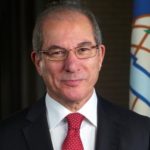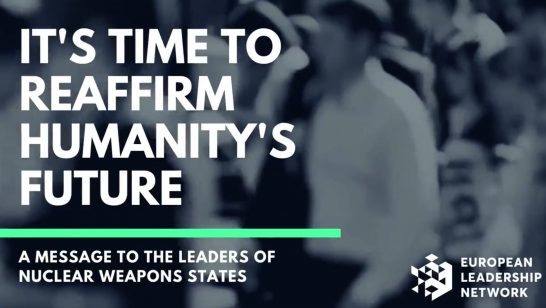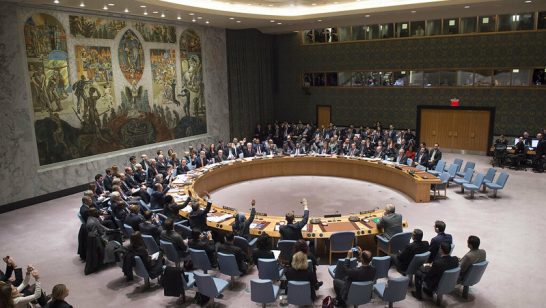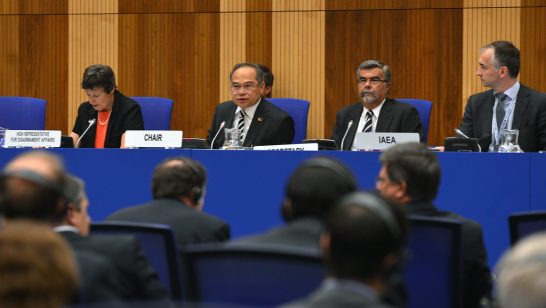
On 3 January 2022, leaders of The People’s Republic of China, the French Republic, the Russian Federation, the United Kingdom of Great Britain and Northern Ireland, and the United States of America -the so-called P5 States- jointly issued a statement reaffirming that a nuclear war cannot be won and must never be fought. Today, select members of the ELN Network reflect on the long-awaited declaration and accompanying text.
***
There is no great harm in the P5 declaring their foremost responsibilities are avoiding nuclear war and reducing strategic risks. Reaffirmation “that a nuclear war cannot be won and must never be fought” cannot be repeated too often, although self-evident. But the claim that nuclear weapons only serve defensive purposes, deter aggression, and prevent war is a statement contradicted by these states’ nuclear policies.
It is established thinking that a few hundred nuclear weapons are enough for the defence and deterrence of nuclear aggression. Yet the US and Russia’s nuclear arsenals count into their thousands, and other nuclear states are increasing theirs too. And cost estimates imply huge investments in the coming years – These can hardly be motivated by defensive purposes.
If nuclear weapons were for defensive purposes only, all nuclear-weapon states should be able to declare a No-First-Use (NFU) policy. So far, only China has done so. Russia had one but no longer adheres to it, and the US has a long history of debating the policy but always ends up leaving options open. The argument is that “policies must be ambiguous about details and it must be clear that nuclear actions would have terrible consequences”. Again, this is hardly in line with nuclear weapons for defensive purposes.
If nuclear weapons were unconditionally for defensive purposes, legal negative security assurances should be issued (at minimum) to states in nuclear weapon-free zones. These states have a double commitment to a nuclear-weapon-free status as signatories of both NPT and a regional treaty. The P5 has not even signed all the protocols of the latter, confirming they would not use nuclear weapons against NWFZ states.
It is not for nothing that nuclear scientists have moved their clock to 100 seconds to midnight, closer to a nuclear catastrophe than ever before. With the current statement, the P5 only confirm the gap between their words and policies. Faced with the Treaty on the Prohibition of Nuclear Weapons, the P5 feel the need to defend their nuclear monopoly and prevent others from gaining these same “defensive weapons that prevent nuclear aggression and war”.
Dr Tarja Cronberg, former Member of the European Parliament; Chair of the Finnish Peace Union, and author of Renegotiating the Nuclear Order: A Sociological Approach, Finland
***
The European Leadership Network has been working hard during the last 18 months in order to engage with the P-5 countries’ representatives, with non-nuclear weapons states, as well as with different civil society organisations. We all worked towards reaching an understanding and agreement on the strategic risk reduction measures which will contribute towards the nuclear disarmament process. Affirmation of the Reagan-Gorbachev statement by the P-5 fits well into these efforts and therefore I welcome this renewed engagement of the respective P-5 states, being encouraged that the NPT Review Conference will provide for an opportunity to continue decreasing nuclear threats and contribute to increasing mutual trust for the benefit of all on our planet.
Goran Svilanović, former Minister of Foreign Affairs and Secretary-General of the Regional Cooperation Council; ELN senior network member and co-chair of the Action Group on Risk Reduction, Serbia
***
The postponement of the Review Conference of the Nuclear Non-Proliferation Treaty (NPT) is another victim of the pandemic. The five states allowed by the NPT to possess nuclear weapons – China, France, the United Kingdom, Russia and the United States – issued a joint statement they probably wanted to deliver in New York.
The fact that the P5 hastened to release this declaration precisely in conjunction with the postponement of the NPT New York conference signals their awareness of the danger of the current strategic situation.
If we exclude the New START strategic agreement between the US and Russia, nuclear stability now rests, more than ever, on the Nuclear Non-Proliferation Treaty (NPT). Today we are witnessing a true nuclear arms race. As for disarmament, we see more steps back than forward.
The postponement of the New York Conference and the recent text of the five nuclear weapons states will hopefully stimulate national and international thought on these issues, particularly in light of the US nuclear posture review and NATO’s new strategic concept later this year. The decisions to be made are not just a matter of strategic arithmetic. Whatever choices or non-choices are made, they will impact the uncertain fate of the RevCon. It is clear that in the coming months, the very future of international security hangs in the balance.*
Ambassador Carlo Trezza, former Ambassador to the Conference on Disarmament; former Chairman of the Missile Technology Control Regime, Italy
***
I welcome the affirmation of the Reagan-Gorbachev statement by the P-5 after nearly four decades. I particularly appreciate that they renewed their commitment to make progress under Article VI of the Non-Proliferation Treaty (NPT). I hope that we will witness, in the years ahead, a gradual but steady nuclear disarmament process in line with the ultimate goal of a global zero. Meanwhile, the P-5 should focus on Strategic Risk Reduction measures as described in their working paper submitted to the NPT Review Conference. Every effort to reduce the risk of a nuclear explosion will serve the common interests of the humanity; ourselves and future generations.
Ambassador Ahmet Üzümcü, former Director-General of the Organisation for the Prohibition of Chemical Weapons; ELN senior network member and co-chair of the Action Group on Risk Reduction, Turkey
***
The opinions articulated above represent the views of the author(s), and do not necessarily reflect the position of the European Leadership Network or any of its members. The ELN’s aim is to encourage debates that will help develop Europe’s capacity to address the pressing foreign, defence, and security challenges of our time.
*A version of Amb. Trezza’s analysis was first printed by Avvenire Italia, 4 January 2022






